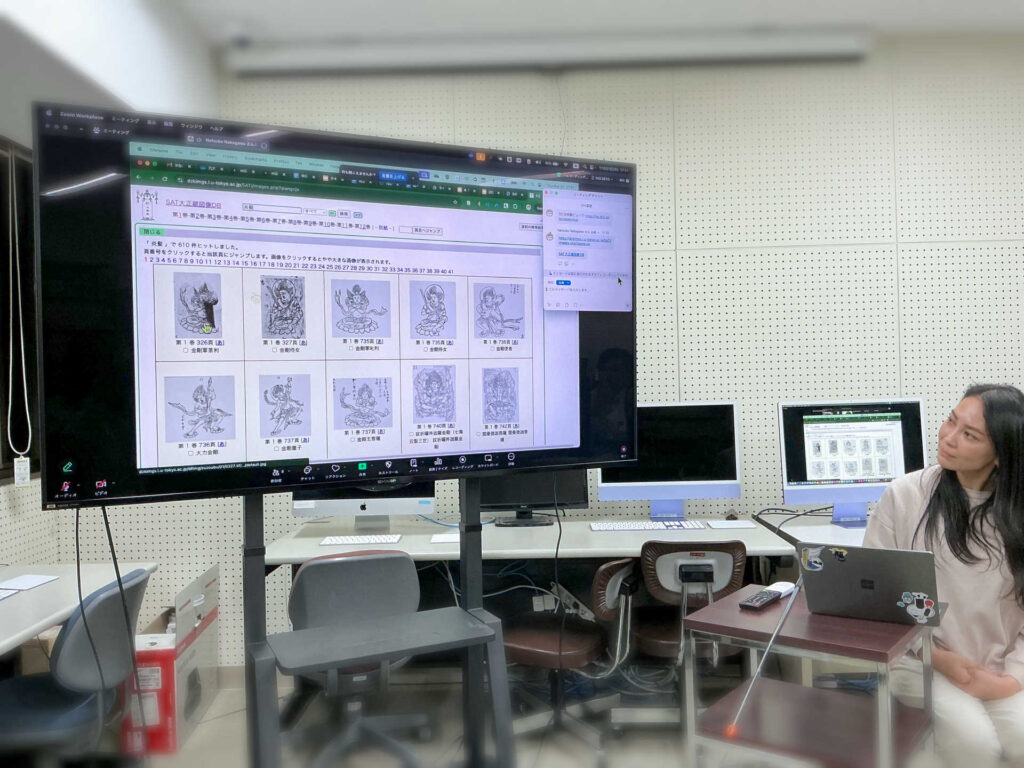


Digital Humanities Team
Digital Humanities Team Overview
The Digital Humanities Team of the Faculty of Humanities (hereinafter referred to as the DH Team) aims to open new horizons in humanities research by utilizing the knowledge and technologies accumulated in the field of information science. This team promotes the integration of information technology and the humanities in both research and education, providing necessary perspectives for academic inquiry and supporting student growth.
Commitment to Education
The three subjects offered as part of the common education curriculum in the Graduate School of Humanities— Humanities and Digital Technologies, Introduction to Digital Humanities, and Implementing Digital Humanities— are designed to teach specific methods for applying the theory and practice of information technology to humanities research. These subjects are taught by faculty members belonging to the Faculty of Humanities who have an academic background in information science.
"Humanities and Digital Technologies"
In this subject, we will explore how digital technology is transforming humanities research and what new possibilities it is creating. Through a step-by-step approach, we will learn from the basics to advanced applications, considering together what can be achieved with digital technology and what challenges arise. Additionally, we will learn through hands-on experience how to effectively combine traditional research methods with digital technology.
The goal of this subject is for students to be able to utilize digital technology in student's own research and discover new approaches. The subject will be conducted in an on-demand format to make it accessible for students from five different majors. Additionally, an environment will be provided using online tools such as Slack, where students can ask questions anytime and engage in discussions with others.
"Introduction to Digital Humanities"
Humanities, which observe human activities and achievements in the long term and in depth, is a field of study that is especially necessary now, as AI is rapidly integrating into society. In this lecture, we will provide a multifaceted overview of why engaging with the humanities is essential for society and why it is necessary to apply digital technology to the humanities.
This lecture is a slightly theory-heavy subject that incorporates the essential elements for applying knowledge and technology from information science to humanities research. Topics include the basics of information science, copyright and licensing, comparisons between AI models and the brain, types of historical materials, spatiotemporal data, structuring information, visualization of image and text data, citizen science, simulations of collaborative research, and mini-lectures by researchers utilizing cutting-edge DH methods. The subject serves as an introduction to DH research being conducted worldwide.
In addition, for DH-specific technologies, we will provide explanatory videos and programs that can run directly in a web browser. Even for those who have never created a program, you can run them as many times as needed while understanding the flow of operations at your own pace, which increases the likelihood of being able to apply these techniques to your own research.
Finally, in the last lecture, you will present the results of a simulation of collaborative research conducted in interdisciplinary student groups. As you progress in DH research, you will consider what types of research have been conducted so far, what data and methods will be needed moving forward, and you will reflect on these points gradually while communicating with your group.
"Implementing Digital Humanities"
Through concrete examples centered on actual texts and image data, students will gain practical experience in programming and analytical techniques, while also cultivating the ability to academically interpret the results of their own reconstructions and explain them to others.
For those involved in the humanities, most likely, there has been little opportunity to experience programming until now. However, starting from scratch to learn programming can be challenging. Therefore, we have provided an opportunity to gradually understand the mechanisms by using various online tools that can run in a web browser, allowing you to execute different DH-related programs while gaining hands-on experience.
Additionally, the final session of the eight sessions will be a "DH Startup Consultation Session, " where we will share and resolve various questions related to introducing DH. This is an opportunity to receive advice on issues such as which equipment you need at home, where to find the necessary materials, and how to structure your own research data.

These three subjects provide learning that builds a bridge between information science and the humanities, offering useful knowledge and skills for students aiming to become researchers or pursue advanced professional careers. You can start with any of the subjects without any issues.
It is also included in the "Digital Humanities" advanced minor program, which fosters interdisciplinary knowledge.
Planning and Hosting Various Internal and External Events to Guide the Creation of New Knowledge through the Fusion of Information Science and the Humanities
The DH team aims to revitalize traditional research methods and build new knowledge systems by incorporating advanced techniques from information science into humanities research. This approach enhances the latent value of humanities research and opens up new horizons in addressing both academic and societal challenges.
Therefore, in addition to lectures, we plan and host DH-related events both on and off campus. Osaka University's Toyonaka Campus (home of the Graduate School of Humanities) and Minoh Campus (home of the Division of Foreign Studies) are particularly well-suited for hosting events, as they are easily accessible from the nearest train stations.
Management and Operation of the DH Lab
The DH team is responsible for the management and operation of the "DH Lab," established as a foundation for applying the information science achievements to humanities research. This lab is equipped with hardware supporting DH, such as large displays, video conferencing systems, iMacs, and software used in humanities research, providing a space where faculty and students can learn and collaborate together. You can visit the lab's page (https://jinbungakurin.hmt.osaka-u.ac.jp/dh_lab).
Collaboration with other teams
The DH team closely collaborates with the Internship Team and the Foundations of Humanities Team to create an environment for exploring interdisciplinary academic fields. This not only supports students in their academic challenges but also enables them to grow with an eye toward diverse career paths.
Related Links
- Humanities and Digital Technologies (on demand)
- Introduction to Digital Humanities (The content is the same in Toyonaka and Minoh)
- Implementing Digital Humanities (Toyonaka)

